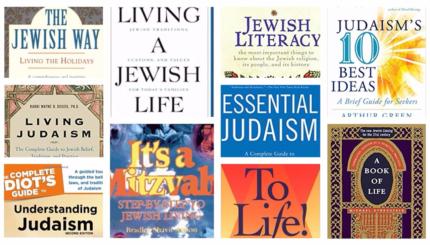Although Judaism espouses the value of bayit, peace among the members of a family, Judaism can also be a source of strife for family members. Differences in levels of Sabbath and observance can make family get-togethers — particularly those surrounding holidays and lifecycle rituals — frustrating. Discussions about current events in Israel, the politics of conversion, or even a decision to send one’s kids to a Jewish day school can sour even the sweetest Passover seder. Changes to family members’ levels of observance can also throw other relatives into confusion or leave them feeling rejected or judged.
Family conflicts arise from countless possible causes — personality clashes, old grudges, money and the list only goes on from there. Sometimes religious differences exacerbate these other issues to the point that Judaism becomes the scapegoat for why a family isn’t getting along. Learning how to negotiate disagreements about Jewish observance and belief won’t solve deeper family issues, but it can provide a framework for allowing Judaism to become a healing medium in a fractured family.
1. Clarify Expectations
All family visits should be preceded by honest discussions about what arrangements might be needed for meals (for example, food), sleeping arrangements (such as separate beds for spouses), or scheduling (like being respectful of prayer times).
Family members hosting and those visiting both have obligations to be specific about what they need, what they want, and what would offend them. For instance, it would be important for guests preferring a Passover that continues after the meal to know ahead of time that their hosts are not planning for it. For both sides, an in-advance list of what is negotiable and what is not may reveal surprising areas of flexibility.

Help us keep Jewish knowledge accessible to millions of people around the world.
Your donation to My Jewish Learning fuels endless journeys of Jewish discovery. With your help, My Jewish Learning can continue to provide nonstop opportunities for learning, connection and growth.
2. Do the Research
You can reach out to your family members by learning more about what they are doing and why. You might want to “learn the lingo” of your Orthodox sibling and read up on the difference between (Jewish law) and (custom). It could be helpful to listen to an audiobook for clues to why Jewish Renewal appeals to your mother’s soul or why your uncle’s recitation of after his father died started him going to daily minyan (prayer service).
You might find yourself researching in response to other people’s questions, too. If family members ask you to explain your observances, but you do not feel prepared with appropriate answers, there is no need to become defensive. The best response is to tell your relative that you’ll get back to him/her, then ask a rabbi or seek answers in books, on the Internet, or elsewhere.
3. Seek Neutral Territory
Family visits can often be made easier by seeking common ground, or at least neutral territory. Intentionally find kosher restaurants you all enjoy, where no one has to cook or worry about “ ing” (making errors in kashrut) someone else’s kitchen. If it is difficult to bridge the differences in expectations for and Jewish holidays, try visiting during other times, like Thanksgiving and school vacations. Plan vacations together where all parts of the family are responsible for planning their own meals and accommodations, but activities are shared.
4. Keep Holy Days Holy
For families facing Jewish diversity, holidays can also be challenging — even when the major lifestyle difference between Reform and Conservative siblings is that the Conservative family keeps kosher. A sibling that observes kashrut may feel the need to host every holiday meal, but also resent that she must pay for all the food and prepare it.
A tense relationship can be relaxed by a simple offer to share some of the expenses and arrive early to participate in the cooking and table-setting. Holy days are kept holy if everyone respects the uniqueness of the occasion and the need for particularly caring behavior at that time.
5. Emphasize Compassion
When dealing with religious difference, many people instinctively take a defensive position, trying to shore up their own identity and rationalize their own choices. It is more productive to take an attitude of compassion, asking: “how can I make you more comfortable?” or affirming uneasiness by saying “I know that this is hard for you.” Making other people’s needs your concern affirms both the authenticity of their feelings and the fact that you care for them deeply.
6. Don’t Try to Convince or Convert
An atheist should not try to sway a God-fearing grandmother from her belief that praying will aid in a child’s healing. An Orthodox man should not argue to his Reform brother that Shabbat observance will make him feel less stressed out, no matter how passionately he believes this is true. Even if you harbor desires that your loved one will become more or less observant, arguing or “proving” your perspective is rarely successful and often causes greater distance and frustration.
This is equally important when confronted by apparent inconsistencies in your loved ones’ behavior. You may never understand why your sister thinks it’s important to belong to an Orthodox synagogue yet only goes once a year. People make their religious choices for a variety of reasons; inherent personality, life experiences, and social context all play a part. No matter where you place religious authority — in a tradition of rabbis, in your own conscience, or in active, contemporary dialogue with and Talmud–you and your loved ones have made religious choices for equally complex and different reasons. Allow your family members to find their own path of Judaism.
7. Make Conscientious Choices When You Plan a Joyous Occasion
If it is important for you to include relatives with a wide range of needs in your (joyous occasion), then keep them in mind during the planning. Check a Jewish calendar so that you don’t accidentally schedule a party on a holiday that is not widely observed. Have a wedding meal catered at a level of kashrut that meets the whole family’s needs or arrange for special kosher meals to be brought in, heated, and served appropriately. Politely let family members know how to dress modestly for the Bar at your synagogue by emphasizing their comfort in your community rather than saying that it is just the right thing to do.
8. Know Your Place
It is important to share control among family members of different backgrounds, but always let the key players have the final say. For example, no relative should assert sole control over all the funeral and mourning arrangements when the mourners themselves are mixed in their level of observance. Though one can’t often plan ahead in these situations, flexibility is crucial. One can schedule various minyanim (prayer services in a house of mourning) for each mourner’s religious community. If mourners want to sit shiva for only three days, rather than the customary seven, no one else should dictate to them otherwise. Similarly, a bride and groom and their parents should be allowed to make arrangements for a wedding without other relatives insisting on particular rituals or customs.
9. Affirm Shared Jewish Values and Observances
A family may no longer attend the same synagogue or be able to eat off each others’ dishes, but there will inevitably be other Jewish values and observances that they still share. Maybe everyone still uses ’s tzimmes recipe for Rosh Hashanah, gives to similar social causes, and puts a on their doorpost. Share stories from the family’s past and talk about their connections to the present.
For more observant family members, it is important to verbally recognize the whole family’s deeply rooted Jewish values and the mitzvot (plural of mitzvah) all family members observe, even if they do so in their own, unconventional ways. For less observant family members, try to express appreciation for the way your relatives’ intricate understanding of ritual obligation is an honest attempt to create persons who behave righteously. In the end, Judaism should continue to keep a whole family bonded together and dedicated to the future.
shalom bayit
Pronounced: shah-LOME BYE-ET, Origin: Hebrew, peace in the home.

Help us keep Jewish knowledge accessible to millions of people around the world.
Your donation to My Jewish Learning fuels endless journeys of Jewish discovery. With your help, My Jewish Learning can continue to provide nonstop opportunities for learning, connection and growth.



